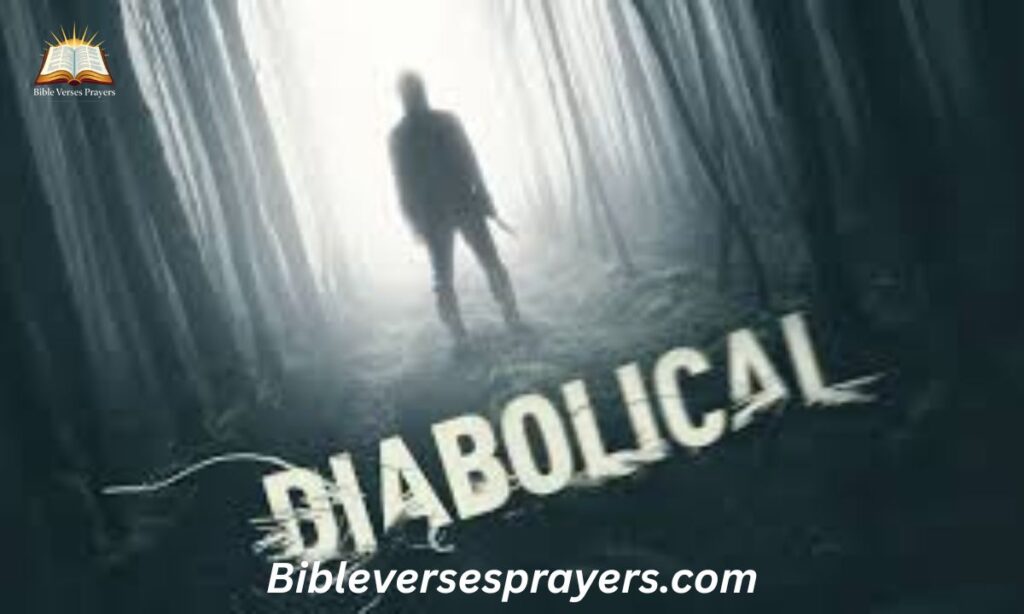The English language is full of powerful words. Some words capture emotions perfectly. Others describe situations with precision. “Diabolical” is one such word.
It carries weight and intensity. Understanding it enriches your vocabulary significantly. This word appears in books, movies, and everyday conversation.
You might hear someone describe a villain’s plan as diabolical. A challenging puzzle could be called diabolically difficult. The word has multiple layers of meaning. Let’s explore them all in detail.
Understanding the Word “Diabolical”
Basic Definition
“Diabolical” is an adjective. It describes something extremely wicked or cruel. The word relates to the devil or evil forces. It suggests behavior that’s deliberately harmful or malicious.
When you call something diabolical, you’re saying it’s not just bad. It’s exceptionally evil. There’s an element of calculation involved. Diabolical actions are planned and intentional. They’re not accidents or mistakes.
The word comes from Latin roots. “Diabolus” means devil in Latin. This comes from Greek “diabolos,” meaning slanderer or accuser. The connection to evil is ancient and deep.
Etymology and Origins
Understanding word origins helps us use them correctly. “Diabolical” entered English in the late 15th century. It came through Middle French “diabolique.” Before that, it traces to Late Latin “diabolicus.”
The Greek root “diabolos” literally means “to throw across.” It suggests opposition or accusation. In religious contexts, it referred to Satan. The devil was seen as the ultimate accuser of humanity.
Over centuries, the meaning expanded. It moved beyond purely religious contexts. Now it describes any extremely evil or cruel behavior. The devilish connection remains in its connotation.
Modern Usage
Today, “diabolical” has two main uses. The first is literal and serious. It describes genuinely evil actions or plans. A serial killer’s methods might be called diabolical. A dictator’s cruelty could be termed diabolical.
The second use is more casual and exaggerated. People use it for difficult or frustrating situations. A complicated exam might be “diabolically hard.” A tricky recipe could be “diabolically complex.” This usage is hyperbolic but common.
In British English, “diabolical” sometimes means simply “very bad.” Someone might say a movie was “absolutely diabolical.” This means it was terrible, not necessarily evil.
Synonyms for “Diabolical”

Language offers many ways to express similar ideas. Here are words that capture aspects of “diabolical.”
Evil and Wicked
- Wicked – This suggests moral badness and harmful intent. It’s slightly less intense than diabolical.
- Evil – The most direct synonym. It describes profound immorality and malevolence.
- Malevolent – This emphasizes the wish to cause harm. It focuses on evil intentions.
- Sinister – This suggests threatening evil. It has an ominous, foreboding quality.
- Vile – This describes something morally despicable. It carries disgust along with condemnation.
Cruel and Harmful
- Cruel – This emphasizes causing pain or suffering. It focuses on the heartless aspect.
- Fiendish – Very similar to diabolical. It suggests devilish cleverness in doing evil.
- Demonic – This directly references demons and evil spirits. It’s intensely negative.
- Monstrous – This suggests inhuman cruelty. It implies behavior beyond normal evil.
- Atrocious – This describes shockingly bad or cruel actions. It emphasizes extremity.
Clever and Cunning
- Devious – This emphasizes underhanded cleverness. It suggests sneaky, indirect evil.
- Cunning – This describes clever deceptiveness. It can be evil or just sly.
- Scheming – This focuses on plotting and planning. It suggests calculated manipulation.
- Machiavellian – This describes ruthlessly cunning behavior. It references political manipulation.
- Nefarious – This describes wicked or criminal actions. It has a slightly archaic feel.
Examples of “Diabolical” in Context
Seeing words in action clarifies their meaning. Here are various examples showing different uses.
Literary Examples
- “The villain’s diabolical scheme involved years of careful planning.” This shows deliberate, calculated evil.
- “Her diabolical laughter echoed through the dark castle.” This creates an evil, threatening atmosphere.
- “The dictator’s diabolical cruelty knew no bounds.” This emphasizes extreme wickedness.
- “He devised a diabolical trap that no one could escape.” This shows clever, evil ingenuity.
Everyday Conversation
- “This crossword puzzle is diabolically difficult.” Here it means extremely challenging, not evil.
- “The traffic today was absolutely diabolical.” British usage meaning very bad or terrible.
- “That was a diabolical movie – waste of two hours.” Casual use meaning extremely poor quality.
- “The exam questions were diabolically tricky.” Exaggeration for very difficult or confusing.
Movie and Television
Villains in stories often have diabolical plans. James Bond movies frequently feature diabolical schemes. The villain wants to destroy the world or gain ultimate power.
Horror movies describe demons and evil spirits as diabolical. Their actions are cruel and supernatural. The word reinforces their threatening nature.
Crime dramas describe serial killers’ methods as diabolical. This emphasizes the calculated, cruel nature. It shows intelligence combined with evil.
News and Journalism
“Authorities uncovered the criminal’s diabolical operation.” This describes organized, calculated crime.
“The scam was diabolical in its complexity.” This emphasizes clever, harmful deception.
“Victims described the torture as diabolical.” This stresses extreme cruelty and suffering.
Diabolical vs. Similar Words
Understanding subtle differences helps precise communication. Let’s compare “diabolical” with related words.
Diabolical vs. Evil
“Evil” is broader and more general. It describes any profoundly immoral behavior. “Diabolical” is more specific. It suggests deliberate planning and devilish cleverness.
A crime can be evil without being diabolical. But diabolical acts are always evil. The difference lies in calculation and complexity.
Diabolical vs. Wicked
“Wicked” can be playful or serious. It sometimes has a lighter tone. “Diabolical” is almost always serious and intense.
You might call a child’s prank “wicked” affectionately. You wouldn’t call it “diabolical” unless joking. Diabolical carries more weight.
Diabolical vs. Cruel
“Cruel” focuses on causing pain and suffering. “Diabolical” adds elements of evil planning and devilish nature.
Cruelty can be spontaneous or thoughtless. Diabolical actions are calculated and intentional. Both are bad, but diabolical implies more.
Diabolical vs. Fiendish
These words are very close in meaning. Both suggest devilish evil. “Fiendish” emphasizes cleverness slightly more. “Diabolical” emphasizes pure evil slightly more.
They’re often interchangeable. “A fiendish plan” and “a diabolical plan” mean essentially the same thing. Personal preference dictates choice.
How to Use “Diabolical” Effectively
Using powerful words correctly improves communication. Here’s guidance for using “diabolical” well.
Choose the Right Context
Don’t overuse “diabolical” for minor annoyances. Save it for truly bad situations. Calling a rainy day diabolical weakens the word.
Use it for calculated evil in serious contexts. Use it for extreme difficulty in casual contexts. Match intensity to situation.
Consider Your Audience
British audiences understand the “very bad” usage. American audiences might find this confusing. They typically associate it more with evil.
Formal writing should use the traditional meaning. Casual conversation allows more flexibility. Know your context.
Pair with Strong Supporting Language
“Diabolical” is a strong word. Support it with other powerful language. This creates consistent tone.
“The diabolical villain plotted relentlessly” works well. “The diabolical person was kind of mean” doesn’t. Match intensity throughout.
Avoid Redundancy
Don’t say “extremely diabolical” or “very diabolical.” The word already implies extremity. Additional intensifiers weaken rather than strengthen.
Just say “diabolical” and let it stand. The word carries its own weight. Trust its power.
Comparison Table: Diabolical and Related Words
| Word | Meaning Focus | Intensity Level | Common Usage |
| Diabolical | Devilish evil + cleverness | Very High | Evil plans, extreme difficulty |
| Evil | General moral badness | High | Any immoral behavior |
| Wicked | Moral badness | Medium-High | Evil actions, playful teasing |
| Cruel | Causing pain/suffering | High | Heartless behavior |
| Fiendish | Demon-like cleverness | Very High | Evil schemes, difficult puzzles |
| Sinister | Threatening evil | Medium-High | Ominous situations |
Cultural References and Pop Culture
“Diabolical” appears throughout popular culture. These references show its versatility and power.
Movies and Television
The TV show “The Boys” features a character named “Diabolical.” This emphasizes his extremely evil nature. The word perfectly captures his malevolence.
Disney villains often have “diabolical plans.” This describes their elaborate evil schemes. The word appears in many children’s movies.
Crime thrillers frequently use “diabolical mastermind.” This describes intelligent, evil criminals. It’s almost a cliché but effective.
Literature
Gothic novels love this word. It fits the dark, evil atmosphere. Victorian literature used it frequently.
Modern thrillers still employ it effectively. Authors describe serial killers and terrorists as diabolical. It creates immediate understanding of threat level.
Fantasy literature uses it for dark lords. Evil wizards have diabolical powers. The word fits magical evil perfectly.
Video Games
Game villains are often “diabolical.” Boss characters have diabolical abilities. Final battles involve stopping diabolical plans.
Players face “diabolically difficult” levels. This describes extreme challenge. The exaggeration is accepted and understood.
Common Phrases and Expressions
Certain phrases commonly pair with “diabolical.” These combinations sound natural together.
- Diabolical scheme – A carefully planned evil plot.
- Diabolical genius – Someone extremely clever at doing evil.
- Diabolical laughter – The stereotypical evil villain’s laugh.
- Diabolical plan – An elaborate strategy for harmful purposes.
- Diabolically clever – Cunningly intelligent in a harmful way.
- Diabolically difficult – Extremely challenging or complex.
- Diabolical nature – Inherently evil character or quality.
- Diabolical plot – A wicked conspiracy or storyline.
Tips for English Learners
If English isn’t your first language, these tips help.
Pronunciation
“Diabolical” is pronounced: die-uh-BOL-ih-kul. The stress falls on the third syllable. Practice saying it slowly first.
Break it into parts: di-a-bol-i-cal. This makes it easier. Then speed up gradually.
Remember the Meaning
Connect it to “devil” in your mind. This helps recall the evil meaning. The similarity isn’t accidental.
Think “devil + logical” for planned evil. This memory trick works well. It captures both elements.
Start with Reading
See the word in context before using it. Read examples in books and articles. This builds natural understanding.
Notice when writers choose “diabolical” over “evil.” This teaches appropriate usage. Context teaches meaning.
Practice Cautiously
Use it in writing before speaking. This gives time to consider appropriateness. Speaking allows less editing.
Start with casual uses for difficulty. “This homework is diabolically hard” is safe. Move to serious uses gradually.
Frequently Asked Questions
What’s the difference between diabolical and diabolic?
“Diabolical” is more common and slightly more intense, while “diabolic” is shorter and less frequently used but means the same thing.
Can diabolical be used positively?
Rarely, and only ironically or humorously, such as calling a clever prank “diabolical” in an admiring way, but it generally remains negative.
Is diabolical too strong for everyday use?
In British English, it’s commonly used for “very bad,” but in American English, save it for truly evil or extremely difficult situations.
What’s a good sentence using diabolical?
“The criminal mastermind unveiled his diabolical plan to rob every bank in the city simultaneously.”
Can diabolical describe objects or only actions?
It can describe both – a diabolical trap, diabolical device, or diabolical puzzle all work grammatically and semantically.
Conclusion
“Diabolical” is a powerful vocabulary word. It describes extreme evil with calculated intention. The word carries centuries of linguistic history. Its roots connect directly to concepts of the devil.
Understanding “diabolical” enhances communication skills. You can describe evil accurately and powerfully. You can also use it casually for difficult situations. Context determines appropriate usage.
The word appears throughout literature and media. Villains have diabolical plans. Challenges are diabolically difficult. These uses feel natural and effective.






